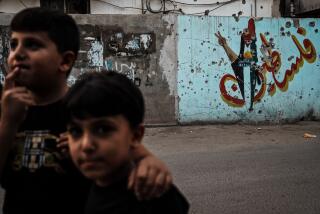Their Evilness Wasn’t Outside History
- Share via
Some reckon that providing any sort of historical context is an outrage to the memory of those slaughtered in the Sept. 11 attacks. Here’s Christopher Hitchens, writing in the current Nation: “Loose talk about chickens coming home to roost is the moral equivalent of the hateful garbage emitted by [evangelists Jerry] Falwell and [Pat] Robertson, and exhibits about the same intellectual content.”
Hitchens seems to be arguing that Osama bin Laden and his Muslim cohorts are so pure a distillation of evil that they are outside history. So all you can tell your kids is that the guys who planned and carried out the attacks are really bad guys.
This really isn’t helpful, particularly since among those kids to whom we are trying to explain Sept. 11 are America’s future leaders and policymakers. Don’t we want them to understand history in terms more complex than those of flag-wagging at the moral level of a spaghetti western?
What moved those kamikaze Muslims, among them many middle-class college graduates from Saudi Arabia and Egypt, to embark on the training that they knew would culminate in their deaths as well of those of thousands of innocent people? Was it Bin Laden’s extreme Muslim fundamentalism? I doubt the suicide bombers went to their deaths in the cause of forcing women to stay home and only go shopping when clad in blue tents or of having men never trim their beards. More likely they were moved to action by Bin Laden’s main political themes as expressed on at least one tape in which he denounces Israel’s occupation of Palestine and U.S. complicity with that occupation. He attacks the corrupt regimes of the Arab world and its leaders as bloodsuckers living off the oil which is a “common property.”
If I had to cite what steeled the homicidal and suicidal resolve of the suicidal Muslims, my list surely would include the exchange on CBS in 1996 between Madeleine Albright, then-U.S. ambassador to the United Nations, and reporter Lesley Stahl. Albright was maintaining that sanctions had yielded important concessions from Iraqi leader Saddam Hussein.
Stahl: “We have heard that half a million children have died. I mean, that’s more children than died in Hiroshima. And you know, is the price worth it?”
Albright: “I think this is a very hard choice, but the price? We think the price is worth it.”
That exchange was infamous all over the Arab world. So would it be unfair today to take Albright down to the ruins of the World Trade Center and remind her of her words? Was that price worth it too?
Until now, America has led a charmed life amid its wars. The wars mostly didn’t come home and the political culture of the U.S. ensured that the ordinary workers in the World Trade Center towers weren’t really up to speed on what was wrought in freedom’s name.
What about Afghanistan? In April 1978, an indigenous populist coup overthrew the government of Mohammed Daoud. The new government of Nur Mohammed Taraki embarked, albeit with a good deal of urban Marxist intellectual arrogance, on land reform; hence an attack on the opium-growing feudal estates. Taraki went to the United Nations, where he managed to raise loans for crop substitution for the poppy fields.
No matter how modern-minded Taraki might be or how feudal his enemies, in the summer of 1979, a U.S. State Department memo showed how the U.S. government viewed the stakes: “The United States’ larger interests would be served by the demise of the Taraki-[Hafizullah] Amin regime, despite whatever setbacks this might mean for future social and economic reforms in Afghanistan. The overthrow of the [Democratic Republic of Afghanistan] would show the rest of the world, particularly the Third World, that the Soviets’ view of the socialist course of history being inevitable is not accurate.”
Taraki was killed by Afghan army officers in September 1979. Fearing a fundamentalist, U.S.-backed regime in Afghanistan, the Soviets invaded that December.
There’s a lot of other relevant history that secretaries and messengers in the World Trade Center probably didn’t know but that those men on the attack planes did. It would honor the memory of those who perished on Sept. 11 to insist that in the future, our policymakers and our press offer a better accounting of how U.S. wars for freedom are fought and what the actual price might include.
More to Read
Sign up for Essential California
The most important California stories and recommendations in your inbox every morning.
You may occasionally receive promotional content from the Los Angeles Times.










